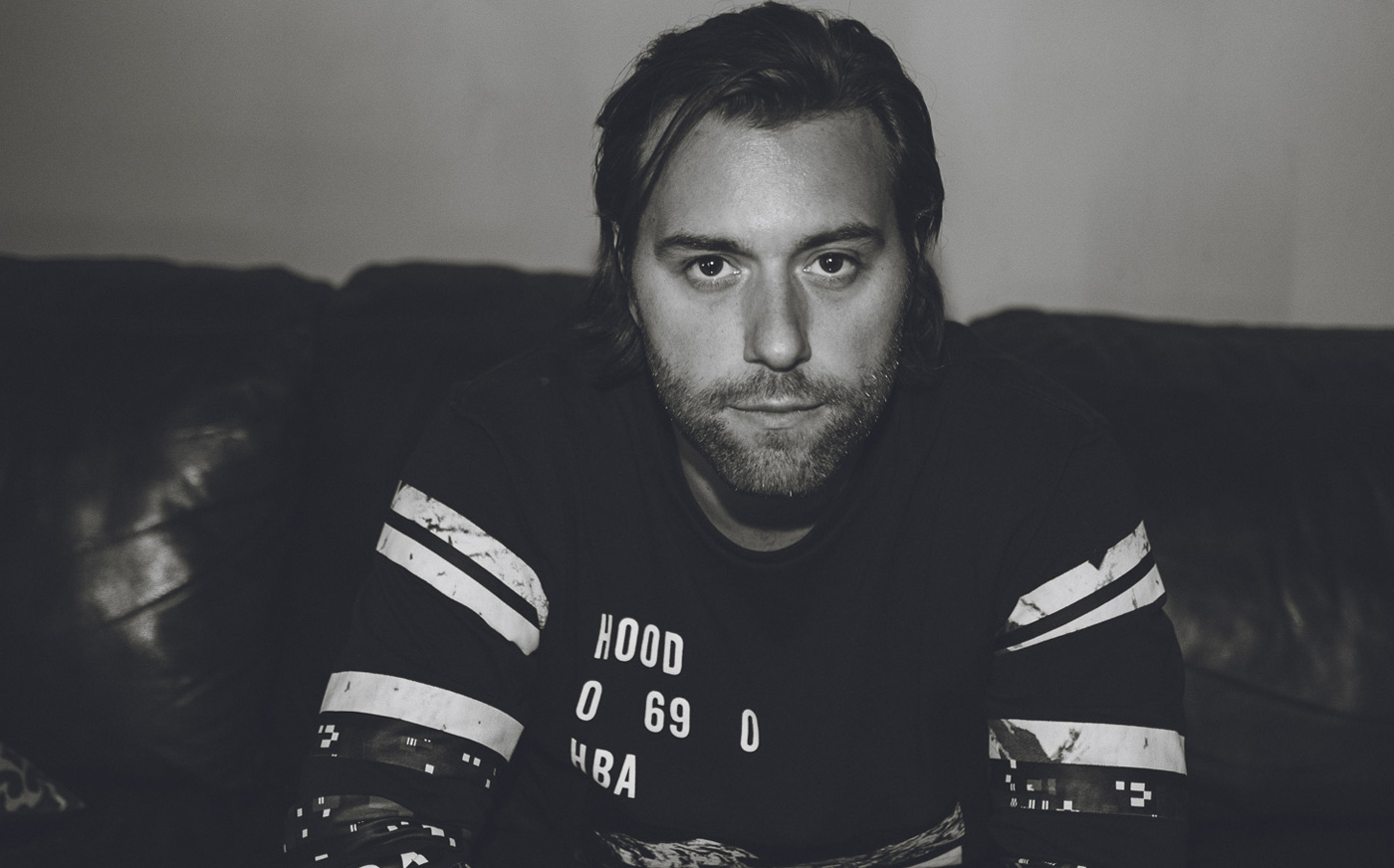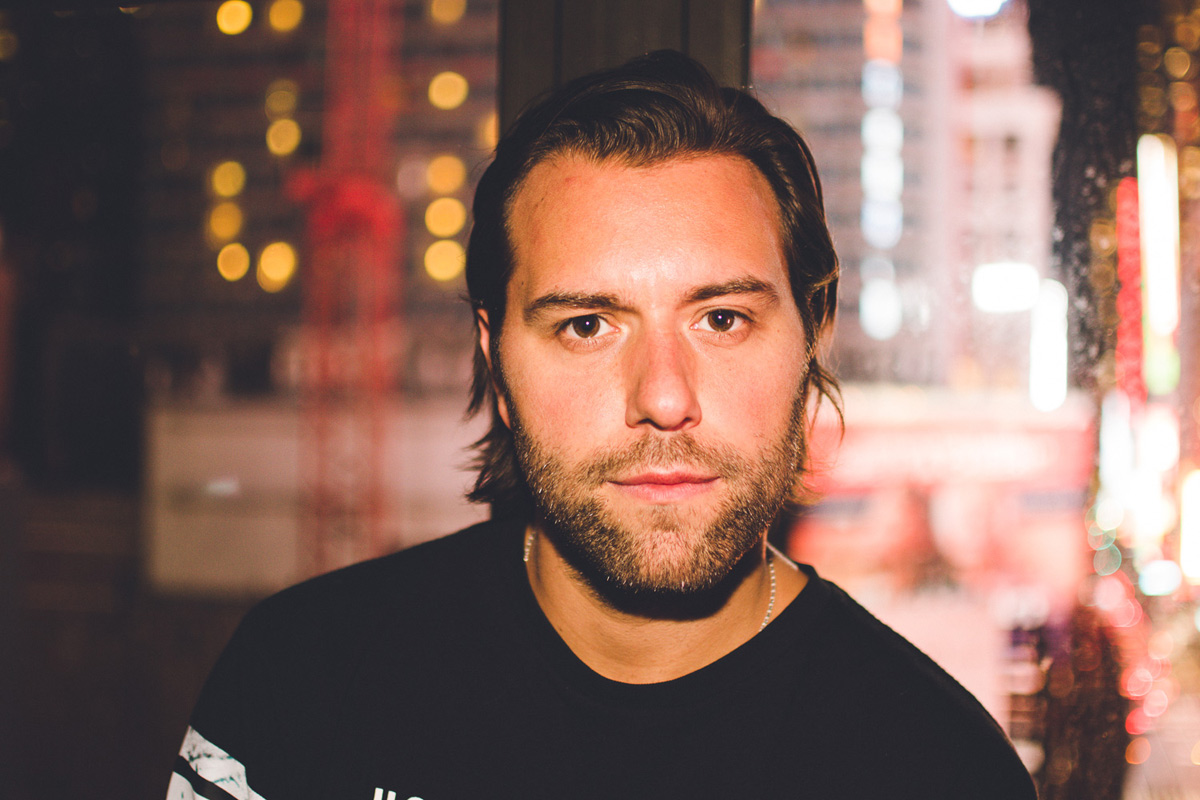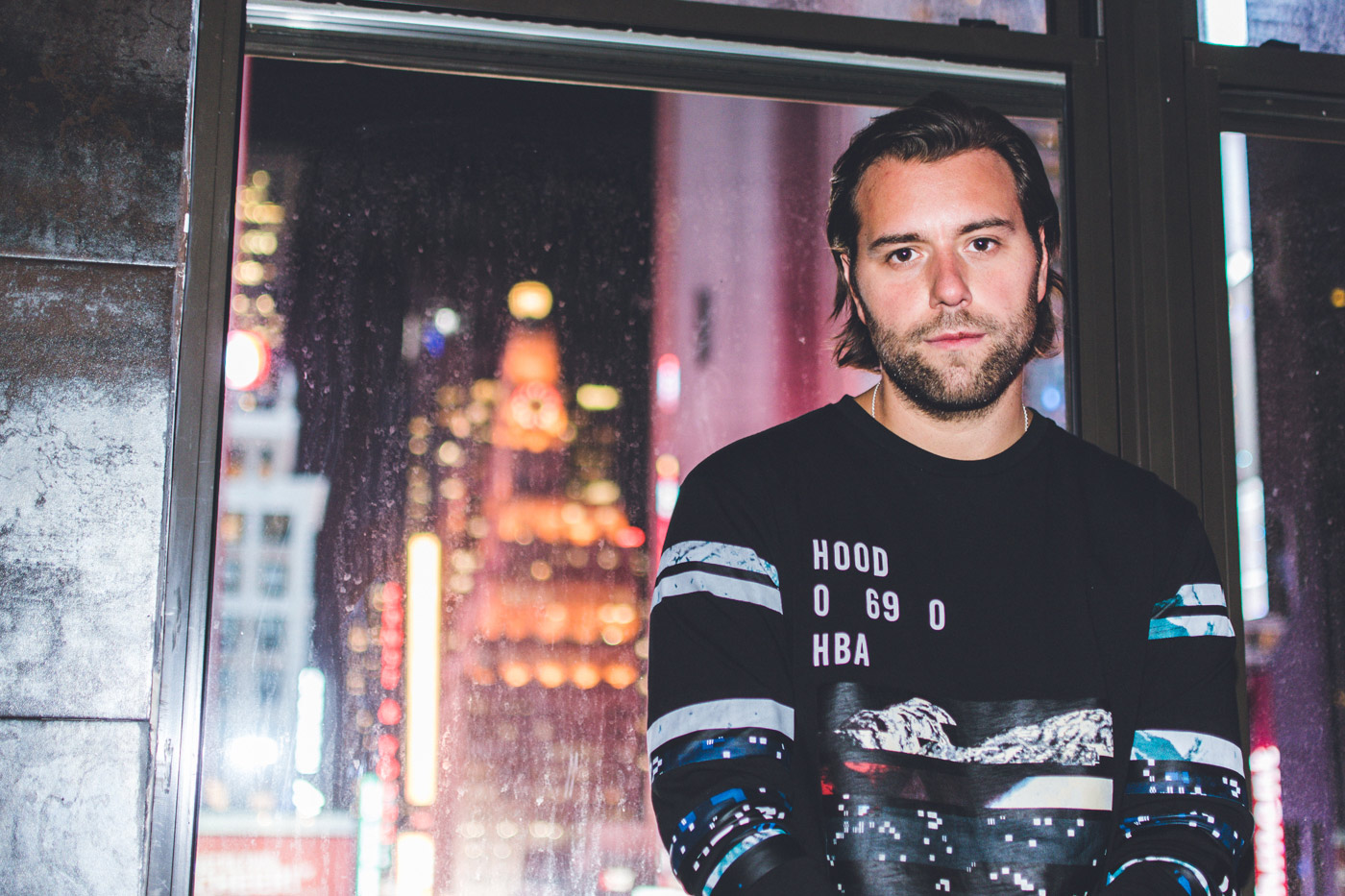With the power to unify people through his music, Sebastian Ingrosso speaks on the evolution of his career and of electronic music; his journey from Swedish sensation to worldwide musical powerhouse
Interview and Photography by Mike Greene
Intro and Transcription by Mari Hercher
Mike: What inspires you?
Sebastian: The new generation inspires me. From the new to the old, if I hear something alien to me, something I’ve never heard before, or when people do things you never thought they would, that inspires me a lot.
Mike: On that note, what are your thoughts on how electronic music has grown in America alone? Ten years ago, it was more punk and rock bands, electronic musicians like Skillex and Deadmau5 were nowhere near as big in the states as they are now. What do you think of that?
Sebastian: I think it’s amazing, I love how the genre has developed, and keeps on developing. It’s becoming more of an open format – you can have a proper trance record with a reggae feel or a dancehall feel, and I love it. There are a lot of people out there doing a great job renewing electronic music and renewing themselves, and just making great music, and I respect that.
Mike: What was it like growing up as a producer in Sweden? What’s the scene like there?
Sebastian: When I started to make and produce music, in Sweden, electronic music was a bad word, it reflected raves and drugs and stuff like that. So it was hard, we always had a wind blowing against us – and then it became big. But to live and produce in Sweden now is amazing because I have my team and my family there, but it’s also nice to produce in other places as well. The scene itself was really small, it’s still very small. So it was hard for us to find places to go and get inspired and listen to music. We had to wait for monthly DJ mixes or MixMag to come out before we could listen to anything new. I loved the Carl Cox mix CD so much, one time I had a DJ gig at my school, and I just put the whole CD on because I didn’t know how to mix yet!
Mike: How did your friends see you, what was school like when it was still an underground thing, since dance music was still a negative term?
Sebastian: All of my friends were saying “What are you doing? What is this music?” – they didn’t like it at all. They were more hip-hop and rock heads, they just thought it was weird. They saw me sitting by my computer and synthesizer and drum machines, and they thought “Yeah, this guy is just out of his mind.”
Mike: And how do they see you now, how has that changed?
Sebastian: I don’t have those friends anymore! They still think I’m a lunatic!
Mike: Is there a particular person that got you into music?
Sebastian: My father. He got me into dance music, he had an electronic/techno label in ‘89, and some of the big guys still DJ’ing out there today he signed back when they were fifteen and sixteen years old.
Mike: Do you think it was in your blood?
Sebastian: I don’t know if it was in my blood, but it became my blood. I loved it from the first time I heard it, I went crazy, something definitely happened. So I started to go into the studio and watch what they did and how they worked – they hated that, I was always this annoying kid.
Mike: Was there any particular musician that either of you listened to that affected how you started out and how you create today?
Sebastian: I listened to a lot of Daft Punk in the later stages, and I listened a lot to Prodigy – Prodigy was my church. Also lots of disco music, even some Chemical Brothers.
“It’s about people – how we help each other. That’s what you learn when you travel. If you don’t travel, you can learn it as well, if you’re brought up that way, but I think it’s crazy how much you can learn from traveling.”
Mike: You travel the world doing what you love, what’s the biggest insight you’ve gained about culture and about people?
Sebastian: What I’ve learned is that there is no “race”. We’re all people. It comes down to one thing, it’s about love, and family, and health. I’ve seen bad things, and some good things and beautiful places – but it all comes back to one thing. It’s about people – how we help each other. That’s what you learn when you travel. If you don’t travel, you can learn it as well, if you’re brought up that way, but I think it’s crazy how much you can learn from traveling. But my conclusion I came to from traveling the world is that ultimately, we’re all the same.
Mike: What about your fans? Has there been anything that’s surprised you or thrown you off?
Sebastian: How dedicated they are. Because I see myself as a normal guy, so I wonder “What is it you like about me? Why me?”. Because if they love you, they really love you – sometimes I just want to hug them. And they do crazy stuff sometimes, they put so much time into things like fan art, or baking a cake with your face on it! There’s so much amazing stuff going on, and I just feel so blessed every day. People ask me everyday “How does it feel to be onstage?” and I try to break it down for them: It’s like when a whole room of people are standing up and singing happy birthday to you and you know everyone in that room is looking at you and singing for you – that’s what it’s like for us all the time. It’s great.
Mike: For example, for the longest time, hip-hop was the biggest thing in America, whereas all over Europe, no matter where you go, it’s all about dance and electronic music. They’re almost polar opposites. Do you think there’s a difference in creating music that will gain popularity in America versus in Europe?
Sebastian: Yes, for sure – Americans, Europeans, and Australians are all different. But if you make it in America, you kind of make it everywhere – it has a pretty big impact. But when we create music, we have these terms, we’ll say “This could be really dope in the UK,” or “It has the UK vibe,”. Or we’ll make something and think, “This might work for top 40 radio in the US.” There are definitely different vibes and sounds that do better in different places, but you make your own music and hope that it works everywhere.
Mike: There are lots of artists that are celebrities in their own countries, but never quite break into the American market. Being an international star yourself, you seem like one of the lucky ones.
Sebastian: That’s true – but today with SoundCloud and Spotify – especially SoundCloud as one of the most international platforms out there, it’s interesting to see how people go from remixing old songs to selling out shows like Kygo, and I love that. It’s such a direct connection from the music to the people through these platforms.
“What my music says about me? It says that same thing – that I’m vulnerable. No matter what kind of music I make, it has to come from me, from inside my head.”
Mike: Speaking of SoundCloud, what are your thoughts on the saturation of music today?
Sebastian: It’s bad in one way, not in that people are illegally downloading and stuff like that – I don’t care about that, I just care that they listen to my songs. That’s all it is at the end of the day. If they listen to my songs, hopefully I can sell some tickets, make some money, and live. The real problem is that with this saturation of music, people don’t have patience for music anymore. They’ll listen to ten seconds, thirty seconds, then they don’t care. It hurts me a little bit, because an artist may work hard to tell a story on an album, and people don’t have the patience to listen to a whole album. In the end, all it is is people paying for their monthly subscription to these platforms. Which means we as artists have to be putting out new music every month to stay a part of these people’s lives.
Mike: A lot of underground artists will put out a new song every week, like a “New Song Friday” and increase their fan base in that way.
Sebastian: I think that’s great! I used to live in LA and I thought it was crazy how you could order a subscription to your favorite ice cream, and every week it would arrive at your door. So why not do it with music? Today it’s almost more important to make it into someone’s playlist than it is to be played on the radio, in a way. But it goes back to the saturation of music – I love that everyone can get out there and make a song, but I’ve also seen the backside of this. Some guy, eighteen or nineteen years old buys a laptop, makes a hit, plays some big festival and gets paid $100k. But what about those people who supported you on SoundCloud? What about the small venues? What about people like us, who had to climb a ladder? That pulls you away from making music that you love, that feels genuine. When I planned my American tour, I told my agent I wanted to play at certain kinds of venues, and I also want to play at clubs without huge ticket fees, so I can connect with my people. If I don’t do that, then what’s the point?
Mike: It’s hard to enjoy yourself at a show or a festival because it’s so expensive.
Sebastian: It’s so expensive, especially with dance and electronic music – everything sounds the same for like seven hours and you paid $300 – I totally understand. I wouldn’t pay that much to listen to the same songs I’ve heard before with maybe a mashup thrown in. I would go to Coachella or Lollapolooza to see ACDC, LCD Soundsystem, Skrillex, and Pharrell – I would rather do that. So I understand that something needs to happen, people need to do make their own unique sound so that these festivals can become more versatile.
Mike: There are so many kids out there that hear your music, get inspired, and make it big. So in a way, you’re feeding into it, by inspiring them to make their music. They want to be like you, and in a way they become like you.
Sebastian: I feel that responsibility, even if you’re a huge star. I really look up to Skrillex, he’s a good friend of mine, and he’s really good about it – he connects with people so well, that no matter what he puts out – a ballad, hard dubstep, or a hip-hop beat – his fans will follow that influence. Because they know who he is. So from there, I think 2016 is going to be an interesting year for music. People are going to take chances and make new stuff, but also people are going to go back to vibes. Today I heard a new Rihanna song, and it wasn’t a huge smash hit. But it was a vibe, and I like it, I could connect with it.That’s enough for me, to connect with people. They should feel that you’re relaxed and genuine, and not just putting stuff out there to make it big. That’s so important.
“The real problem is that with this saturation of music, people don’t have patience for music anymore. They’ll listen to ten seconds, thirty seconds, then they don’t care. It hurts me a little bit, because an artist may work hard to tell a story on an album, and people don’t have the patience to listen to a whole album.”
Mike: What’s the most surprising thing you’ve learned about yourself over the course of your career, whether in Swedish House Mafia or with Axwell now?
Sebastian: How vulnerable we are, both physically and mentally. We’re just like everybody else. If I go drink a whole bottle of Tequila, I’m gonna be a wreck the next day just like anybody else. And I also learned how to focus, I trained myself to really focus.
Mike: On that note though taking a darker turn for a bit, I read that some artists suffer from Post Traumatic Stress Disorder because you stand onstage and have an hour of the most surreal sensation that most people never experience. How do you cope with that?
Sebastian: I actually had a little bit of anxiety on the bigger tours, going from standing in front of thousands of people into a car by yourself, where you have no one and nothing to share your experience with. So I can understand that – it’s a terrible feeling, and some people get over it and get stronger, and some people take to a bottle or pills to numb it. But you have to keep strong, you have to talk about it.
Mike: An artist’s music is typically a reflection of themselves, in one way or another. What does your music say about you?
Sebastian: To me, it says that same thing – that I’m vulnerable. No matter what kind of music I make, it has to come from me, from inside my head.
Mike: As you transitioned from Swedish House Mafia to Axwell/\Ingrosso now, how did find yourself evolving as an artist and as a person?
Sebastian: One big change was our massive tour that happened during this tsunami of dance music sweeping across the world. Now that that’s sort of settled, I learned that it’s hard work. Now it just seems like time to reset and just make music, it’s all about the music. Swedish House Mafia, Sebastian Ingrosso, and Axwell/\Ingrosso are three different things, and I love that. I get to be in three different “rooms”.
Mike: That leads me to my next question, what’s something you’ve learned from collaborating with so many different individuals, and how do you collaborate amongst these three different versions of yourself?
Sebastian: When it comes to Axwell/\Ingrosso, it’s different every time. Sometimes he has an idea, or I’m writing something on the piano, or we just come up with a cool groove. Or with Swedish House Mafia, sometimes Steve would come in with a song, and I already had an a capella that I recorded with a rapper in Sweden, and we just mashed them together and it was sick. Sometimes all three of us would be working on a song on the guitar, maybe sitting on this song for five years and think now’s the time to finish the song and we’d produce it. So it was and is different every time, and that’s the fun part about it to be honest.
Mike: Very cool. You have an almost cultlike following, what’s the biggest insight you’ve gained from having this much power?
Sebastian: You answered your own question – it’s power. That’s what I’ve learned. So you can do things – you have to have the responsibility to take that power and make something good out of it. Especially back in Sweden, I do a lot of charity stuff, and even here we were able to raise a million dollars in one night for Hurricane Sandy. So I learned you can do a lot with that power.
Mike: Any last words for the fans?
Sebastian: Never give up on your dreams because you’re just as good as everyone else. Just dream bigger, and you’ll get there.
Sebastian Ingrosso on Twitter
Sebastian Ingrosso on Instagram












